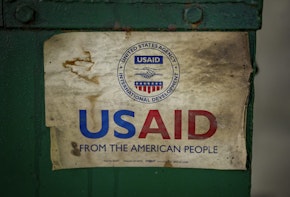Under the presidency of Donald J. Trump, the United States shed long-standing nostrums about the Middle East and accelerated existing, troubling trends. Today, Washington has abandoned any pretense of playing the honest broker in the Israel–Palestine conflict. It has allowed, and even encouraged, a factional split among its Arab allies in the Gulf, and has exacerbated the regional conflict between Iran and Saudi Arabia. While U.S. arms sales have fed growing conflicts, U.S. diplomacy has been AWOL. The lame-duck period presents a heightened risk of last-ditch grabs by authoritarian leaders who received a blank check from Trump. Israel could make further moves to annex Palestinian land. Saudi Arabia and the United Arab Emirates might make feints in Yemen, in Libya, or against domestic dissidents. The Trump administration has already tried to limit its successor’s room for maneuver on Iran by piling on sanctions and, some fear, by seeking further direct conflict with Iran in Lebanon, Iraq, or elsewhere in the region. Whatever happens during the lame-duck period, incoming president Joe Biden will face a Middle East gripped by dynamics that are different from those of four years ago. What dangers loom during the final days of the Trump administration? And under the Biden administration, how much of a reset or redirection is possible? In this roundtable, TCF’s Middle East experts give their best answers to these questions.
Three Reasons Biden Will Be Stuck in the Middle East
 Aron: Every new U.S. president over the past twenty years has promised to spend less time and money on the Middle East, only to then do the opposite. Now that Joe Biden has managed to pry the presidency out of Donald Trump’s hands, he may well carry that tradition into the 2020s.
Aron: Every new U.S. president over the past twenty years has promised to spend less time and money on the Middle East, only to then do the opposite. Now that Joe Biden has managed to pry the presidency out of Donald Trump’s hands, he may well carry that tradition into the 2020s.
Although Biden has signaled a desire to demilitarize U.S. policy, rejoin the Iran deal, and bring “the vast majority” of U.S. troops home, there are at least three reasons the Biden-led United States will remain stuck in the Middle East.
The first one has to do with Biden’s own political coalition, which includes many veterans of the Washington foreign-policy establishment that Obama’s advisers dismissively labeled “the blob.” Biden’s foreign policy team, by virtue of its mostly laudable core ambition—to restore pre-2017 normalcy—seems very likely to also re-empower Washington’s compulsively interventionist Middle East policy set.
The second obstacle is the sorry state of the region itself. The Arab regional system is in slow collapse for reasons that are primarily internal and structural, but which can still be counted on to demand U.S. attention. Conflict, oil price shocks, bank crashes, and COVID-19 have ravaged Lebanon, Syria, and Iraq, and all three are sliding toward devastating breakdowns. Current U.S. policy does little to alleviate this risk. In the case of war-torn Syria, American policy is actually exacerbating the problem through bank and fuel blockades geared to no discernible end other than economic implosion. A de-escalation with Iran might remove some drivers of regional instability, but the situation is now so dire that the Middle East needs a more fundamental reset aiming for basic stability and recovery. If not, today’s waves of unrest may seem like little ripples in retrospect.
Last but not least, the Trump White House is busily creating new crises. In the space of a week, the administration has made impromptu announcements of U.S. troop retreats from Iraq and Afghanistan, decades of U.S. policy on Israeli settlements being wrung inside-out, and a potential terror designation of the Houthi regime timed to magnify Yemen’s impending famine. The desperadoes at 1600 Pennsylvania Avenue have nearly two more months to rig time bombs for their successors.
The Iran Conundrum
 Dina: The Trump administration’s “maximum pressure” campaign failed on its own terms: Iran continues to expand aspects of its nuclear program, while it lashes out in the region. The incoming Biden administration has an opportunity to redress this failure. The first step is to return to the 2015 nuclear deal with Iran from which Trump walked away. This would help secure “compliance-for-compliance,” where Iran returns to compliance if the United States rejoins. There is only a small window for this to happen: Iran’s own presidential elections are in June 2021, and there is a very real chance that the next Iranian president will not be as open to dialogue if the United States has not atoned for its “sin” of leaving the deal.
Dina: The Trump administration’s “maximum pressure” campaign failed on its own terms: Iran continues to expand aspects of its nuclear program, while it lashes out in the region. The incoming Biden administration has an opportunity to redress this failure. The first step is to return to the 2015 nuclear deal with Iran from which Trump walked away. This would help secure “compliance-for-compliance,” where Iran returns to compliance if the United States rejoins. There is only a small window for this to happen: Iran’s own presidential elections are in June 2021, and there is a very real chance that the next Iranian president will not be as open to dialogue if the United States has not atoned for its “sin” of leaving the deal.
Returning to the deal would only be step one to a broader de-escalation and, possibly, some sort of state-to-state relationship. The Biden administration will aim to expand and strengthen existing provisions of the nuclear deal, while addressing other concerns about Iran’s behavior, including its destabilizing activities in the region and its missile program. So far, the only proven way to get Tehran to constrain or change its behavior is by persevering with dialogue and obtaining concessions in return for carrots.
But the incoming U.S. administration should avoid the mistake of thinking that it can take its time, in the belief that it holds all the leverage and should therefore delay rejoining the deal to obtain more concessions from Iran. After all, Iran too believes it is in a stronger position today, after months of building up its nuclear program. And the more time it has, the more its nuclear program, and other regional military activities, will advance.
Still Time to Shake up Iraq
 Sajad: With less than two months remaining in his term, Trump is signaling his intent to use that time to fulfill campaign promises and accelerate policy implementation, potentially binding the next president for well beyond a year. In Iraq, the hope that Biden’s win could reduce tensions with Iran and prevent them playing out in Iraq was quickly replaced with anxiety over whether Trump and Iran would have one last game of brinkmanship. In just one week these tensions jostled Iraq, as several events played out rapidly, adding whiplash to the Iraqi government’s long list of ailments.
Sajad: With less than two months remaining in his term, Trump is signaling his intent to use that time to fulfill campaign promises and accelerate policy implementation, potentially binding the next president for well beyond a year. In Iraq, the hope that Biden’s win could reduce tensions with Iran and prevent them playing out in Iraq was quickly replaced with anxiety over whether Trump and Iran would have one last game of brinkmanship. In just one week these tensions jostled Iraq, as several events played out rapidly, adding whiplash to the Iraqi government’s long list of ailments.
First, Christopher C. Miller, the acting U.S. secretary of defense, announced that a partial drawdown of U.S. troops from Iraq would begin imminently. This immediate drawdown is a key demand of Iran-aligned political forces in Iraq, but it leaves the Iraqi prime minister, Mustafa al-Kadhimi, with even less support from the United States as Trump seeks to fully disengage. A few hours after Miller’s announcement, a rocket attack aimed at the U.S. Embassy in Baghdad was claimed by a pro-Iran militia, which warned that a temporary truce was over. This came despite instructions from the head of the Iranian Revolutionary Guard Corps’ Quds Force, who was in Baghdad to warn allies to avoid provoking Trump in his last few weeks in office. Two days later, the State Department announced that waivers on secondary sanctions given to Iraq to allow trade with Iran would be reduced to just 45 days, down from 120, raising the potential for sanctions to be applied to Iraq in Trump’s final few days in office, in January. Against this backdrop, Trump is reportedly considering military options for attacks against Iranian assets and allies in Iraq.
The Iraqi government is seemingly helpless to prevent a U.S.–Iran conflict in its territory. The last weeks of the Trump administration do not augur well for the country. For Trump, a last opportunity to flex his muscles with little political cost will appeal to him, his base, and the hawks who have backed his policies. But even the most limited military tit-for-tat cycle between the United States and Iran could significantly destabilize Iraq.
Reversing Trump on Israel–Palestine
 Dahlia: Donald Trump’s policy in Israel–Palestine and the Middle East displayed the principles that drove his foreign policy: unilateralism, shunning allies, undermining multilateral action, and weakening international alliances.
Dahlia: Donald Trump’s policy in Israel–Palestine and the Middle East displayed the principles that drove his foreign policy: unilateralism, shunning allies, undermining multilateral action, and weakening international alliances.
The president’s unending string of gifts to Israel and constant battering of the Palestinian position destroyed any semblance of equal footing between Israelis and Palestinians in negotiations (which, to be fair, was a long-running chimera). The policy was driven by Trump’s own political self-interest in cementing Jewish and Evangelical voter support, and was consistent with his general personalization of U.S. foreign policy.
Attempting to strong-arm the Palestinians through financial bribery and punishment, while reneging on the Iran nuclear deal, represents a dismissal of diplomacy in favor of economic bullying and a threat of force. Both failed: the Palestinians simply walked away, while Iran hit the gas on its nuclear program.
In its dealings with Israel, the Trump administration demonstrated its contempt for one of the most hallowed international norms—the prohibition against conquering territory by force—by recognizing Israel’s annexation of both the Golan Heights and West Bank settlements as legal.
During the lame-duck phase, the Trump administration has already signaled continuity. But while one more gift to Israel might not make things significantly more difficult than they already are, a show of military force against Iran will have irreversible consequences.
The incoming Biden administration has a menu of policies to reverse. Symbolic and material gestures to the Palestinians will advance buy-in for future negotiations and de-escalate tensions on the ground. Working with European allies can help unify that bloc’s internal divisions over Israel to reach coordinated forms of political pressure for concessions, while weaning Israel off its long-standing presumption of impunity. Reversing U.S. secretary of state Mike Pompeo’s position on settlements would mark a recommitment to international law. And in a gesture of good faith, the Biden team can praise the Israeli–Gulf normalization while leveraging the recent deals with Bahrain and the United Arab Emirates to support, rather than undermine, conflict resolution.
Neither Joe Biden nor a magician can conjure up Israeli–Palestinian peace or a pacifist Iran overnight. But his administration can immediately demonstrate reversal of the Trump principles, while cleaning up the damage they have done—and still might do—by January 20.
Emboldened Authoritarian Partners
 Michael: The Trump years have been characterized by the president’s unseemly embrace of Washington’s autocratic partners in the Middle East. As a result, these partners have felt unhindered in pursuing their authoritarian approach. While U.S. stances on human rights and democracy have, historically, often suffered from inconsistency and hypocrisy, their total absence as an American priority over the past four years has created a permissive international environment for authoritarianism and repression. As the Trump administration enters its final weeks, there is a real risk that those very same actors will now try to pursue their maximalist goals during this lame-duck period, while still shielded by a distracted and acquiescent United States.
Michael: The Trump years have been characterized by the president’s unseemly embrace of Washington’s autocratic partners in the Middle East. As a result, these partners have felt unhindered in pursuing their authoritarian approach. While U.S. stances on human rights and democracy have, historically, often suffered from inconsistency and hypocrisy, their total absence as an American priority over the past four years has created a permissive international environment for authoritarianism and repression. As the Trump administration enters its final weeks, there is a real risk that those very same actors will now try to pursue their maximalist goals during this lame-duck period, while still shielded by a distracted and acquiescent United States.
The most immediate example of this phenomenon is the current wave of arrests and repression in Egypt, where the country’s most important surviving rights organization (the Egyptian Initiative for Personal Rights, or EIPR) is now under sustained assault. Egyptian civil society has been in survival mode for many years now, and these latest detentions and the state’s attendant media campaign against EIPR are emblematic of a regime unwilling to tolerate any forms of independent thought and dissent.
The timing of these actions suggests an intent by an authoritarian partner of the United States to create facts on the ground in the waning days of the Trump era—while also sending an unfortunate signal to the incoming Biden administration. The international condemnation has been fairly swift and broad, perhaps reflecting a sense of the new possibilities offered by a new U.S. administration. The regime of Abdel Fattah el-Sisi is unbowed, however, and whether it has miscalculated in launching this crackdown will be determined by how the United States and others will translate their rhetoric and condemnation into concrete actions.
If the response of the United States and its allies remains limited to the realm of Twitter and official statements, then Egypt’s intransigence will have been rewarded, and a troubling precedent will mark the beginning of the Biden administration’s stewardship of U.S. diplomacy in the region.
A Renegade Bureaucracy
 Thanassis: One of the most alarming, historic legacies of the Trump era is the wanton disregard of parts of the U.S. government machinery for democratic oversight. The executive presidency has gained ever-increasing authority, while public visibility and Congressional oversight have progressively weakened, something that is most obviously evident in the atrophying of the War Powers Act. Today, the U.S. national security apparatus is able to chart a policy course with far too much independence from political oversight—and that is a problem, whether the president in question espouses policies that are terrible, enlightened, or somewhere in between.
Thanassis: One of the most alarming, historic legacies of the Trump era is the wanton disregard of parts of the U.S. government machinery for democratic oversight. The executive presidency has gained ever-increasing authority, while public visibility and Congressional oversight have progressively weakened, something that is most obviously evident in the atrophying of the War Powers Act. Today, the U.S. national security apparatus is able to chart a policy course with far too much independence from political oversight—and that is a problem, whether the president in question espouses policies that are terrible, enlightened, or somewhere in between.
The runaway security state gathered momentum at the onset of the ill-conceived “war on terror,” gained a new sense of power under the presidency of Barack Obama, and went fully off the rails under Trump.
As president, Obama was mostly in sync with the security establishment. But whenever he tried to depart from its orthodoxies, he found himself undermined and boxed in by security officials—as when he tried to close the detention center at Guantanamo Bay or to consider serious troop reductions in Afghanistan. Similarly, opponents of Trump’s policies welcomed an unhealthy “adults-in-the-room” trope and cheered developments that contained bad Trump policies, even if those developments simultaneously undermined democracy. The result is a cohort of policy professionals who feel entitled to ignore political instructions as they execute some of the United States’ most sensitive and important powers—most crucially, the life-and-death matter of making war, but also surveillance, intelligence-gathering, and the country’s global defense footprint.
Let there be no ambiguity: national security policy, especially war and peace, is solely the province of elected civilians, who are accountable to American voters. Career professionals should decide how to execute that policy—but they don’t decide whether the United States goes to war, or when its troops come home.
In some alarming cases, the military has slow-rolled White House policies to the point of insubordination. Recently, Trump’s Syria envoy, a career professional who served in every president’s administration since Jimmy Carter’s, blithely told a reporter that he (and presumably his colleagues at the Pentagon and State) played a numbers game, and never actually withdrew the troops from Syria that Trump had ordered.
Never mind that Trump’s hastily ordered withdrawal was sloppy policy, carelessly rolled out. As it turns out, the United States took the reputational hit for withdrawing and betraying its Kurdish allies—and at the same time, didn’t reap the benefits of actually withdrawing.
Most problematically, the bureaucracy did what it wanted, not what the White House told it to do. Trump’s policies were terrible, but it is worse still to reckon with a runaway security state that openly flaunts presidential orders and apparently feels entitled to decide which policies to implement and which to undermine. This disconnect will take Herculean labor to repair, and it is likely to cause trouble not only for Biden but his successors.
Familiar Faces, Familiar Policies?
 Rohan: The biggest winner of this election may be the foreign policy establishment. As Biden desperately pleads for unity and consensus, there appears no better group than the establishment to heed such a call. But the incoming administration’s top concern with restoring moral leadership papers over substantive differences within the foreign policy establishment, just as opposition to Trump’s erratic maneuvering kept his critics relatively unified over the past four years.
Rohan: The biggest winner of this election may be the foreign policy establishment. As Biden desperately pleads for unity and consensus, there appears no better group than the establishment to heed such a call. But the incoming administration’s top concern with restoring moral leadership papers over substantive differences within the foreign policy establishment, just as opposition to Trump’s erratic maneuvering kept his critics relatively unified over the past four years.
With the real possibility of a Republican-controlled Senate and a national security bureaucracy that has shown its willingness to undermine the White House, Biden may have no choice but to rely on this group to get anything done. In terms of Middle East policy, it’s less clear what the concrete implications are.
Thanks in large part to Trump, the goalposts have shifted, and the appetite for some of the most interventionist policies has been curbed. We may even see a winding down of the forever wars and an end to U.S. support for the Saudi-led war in Yemen. But these developments shouldn’t be conflated with a transformative vision for U.S. engagement with the region. Mass protests will continue to catch the foreign policy establishment off guard, and the authoritarian excesses of autocratic leaders will have solidified into problems that can only be managed, not remedied.
“Restoration” may quickly turn into a politics of “stability” that favors the new status quo—both at home and abroad. At best, the foreign policy establishment will realize that it can manage the decline of U.S. power in such a way that takes military restraint and democratic values seriously. At worst, the myth of restoration will resurrect a form of imperial hubris that will be more impotent and disappointing than before.
















